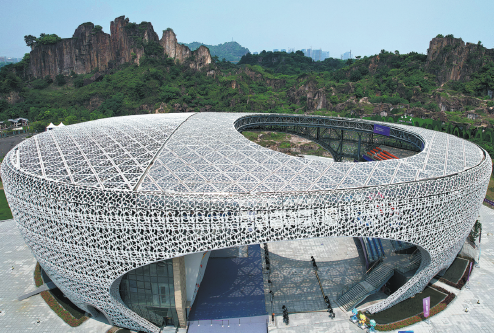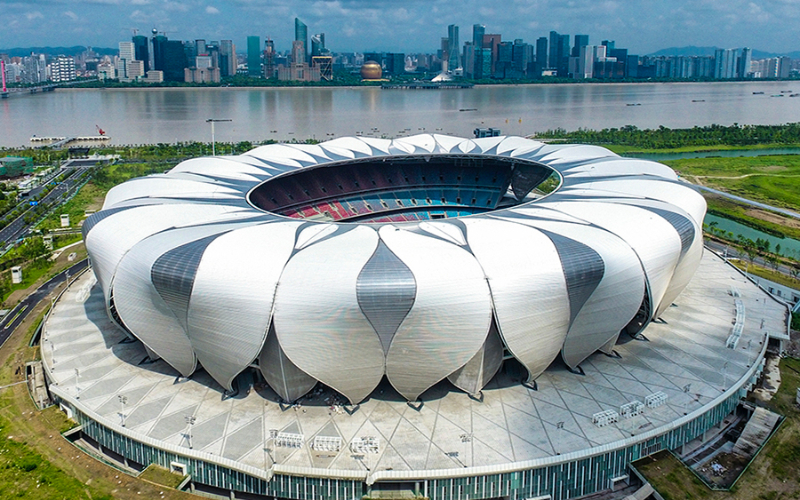Diplomats awed by Zhejiang's rapid digital development

The Shaoxing Keqiao Yangshan Sport Climbing Center in Shaoxing city, Zhejiang province, will hold climbing event during the upcoming Asian Games. LONG WEI/FOR CHINA DAILY
Visiting envoys impressed by application of advanced tech to spur growth
Upon his arrival in Zhejiang's provincial capital Hangzhou recently, Abrao dos Santos, East Timor's ambassador to China, was immediately struck by the tremendous changes he witnessed.
The major difference from his previous visit almost three years ago was Hangzhou Xiaoshan International Airport's new Terminal 4. Officially starting operations in September last year, the terminal covers an area of 720,000 square meters and is double the combined area of the airport's three other terminals.
The sleek-looking terminal is equipped with state-of-the-art technologies and intelligent services. For instance, it is the first in China to offer 5G self-driving electric shuttles. Over 50 million passengers are expected to transit through T4 each year. "It simply boggles my mind that a futuristic megastructure like the terminal can be put in place in such a short span of time," he said.
In November 2020, the ambassador attended the Third China Shaoxing International Friendship Cities Conference held in neighboring Shaoxing.
This time, he was part of an international diplomatic delegation on a three-day tour of Hangzhou, Shaoxing, Huzhou and Jiaxing.
One purpose of the trip was to explore the latest developments in China's digital economy and technologies, which are driving Zhejiang's rapid advancement.
A report released by the China Academy of Information and Communications Technology think tank shows that China's digital economy stood at 50.2 trillion yuan ($7.01 trillion) last year, the second largest in the world, and accounted for 41.5 percent of GDP.
Home to the nation's leading e-commerce and internet companies such as Alibaba, Zhejiang saw its digital economy grow by 12 percent last year, reaching 4 trillion yuan.
Arthayudh Srisamoot, Thailand's ambassador to China, said, "Zhejiang has developed tremendously over the past 20 years", especially in the areas of the digital economy and e-commerce.
Over the years, people in both China and Thailand have benefited from the development of the digital economy, he said. In December, the first digital free trade zone jointly developed by Alibaba and the Thai government officially began trial operations. Thai consumers are able to receive their e-commerce orders from China within three days, compared with 10 days in the past.
Bishnu Pukar Shrestha, Nepal's ambassador to China, said e-commerce allows Nepal to participate in the global economy by realizing the potential of local markets.
However, as Nepal's e-commerce industry is still in its infancy, Shrestha said the country will need help in developing infrastructure for e-banking, online payments and big data. Technological cooperation with China in e-commerce and digitalization will be welcomed, he added.
High-tech digital technologies have been applied across a wide range of fields in Zhejiang.
In Huzhou, the United Nations Global Geographic Information Knowledge and Innovation Center leverages geographical information technologies to address challenges related to natural resources, climate change and public health security. The use of these technologies also helps implement the United Nations 2030 Agenda for Sustainable Development.

Self-driving electric shuttles will serve the upcoming Asian Games in Shaoxing, Zhejiang province. LONG WEI/FOR CHINA DAILY
The Digital Ancient Museum in Shaoxing city employs unmanned aerial vehicle laser scanning, an advanced noncontact measurement technology, to scan and model the 9.09 square kilometers of the ancient city, to better protect and pass on its rich cultural heritage.
All these advances are due to the major efforts of Zhejiang and the central government "to maintain the balance of development and preserve the environment in such a way as to benefit future generations", said Arthayudh, the Thai envoy.
While developing the digital economy and technology have long been priorities for the province, the rapid transformation has also been driven by the Asian Games, which will open in Hangzhou on Saturday.
The changes are evident in the competition venues constructed for the Games, according to the visiting envoys. "What stands out the most is the beauty," said Monrada Yamkasikorn, a Thai diplomat, pointing at the Shaoxing Keqiao Yangshan Sport Climbing Center in Shaoxing, one of the five co-host cities. "It simply blends in with nature."
Sitting close to Yangshan Stone Buddha Scenic Area — the venue where six gold medals will be up for grabs — is a structure resembling a silkworm cocoon built on the site of an abandoned mine. The cocoon is a cultural symbol of sericulture in Zhejiang and shows the host's commitment to staging a green, smart, economical and ethical Asian Games.
Figures from the Hangzhou Asian Games Organizing Committee indicate that over 12,400 athletes have registered to participate in the Asian Games, the largest number of participants ever.
mazhenhuan@chinadaily.com.cn
-
REPLAY: Last leg of Hangzhou Asian Games torch relay
September 20, 2023
-
Xi sends congratulatory letter to cross-Strait youth development forum
September 15, 2023
-
Experience a green, low-carbon lifestyle at Asian Games Village
September 13, 2023



